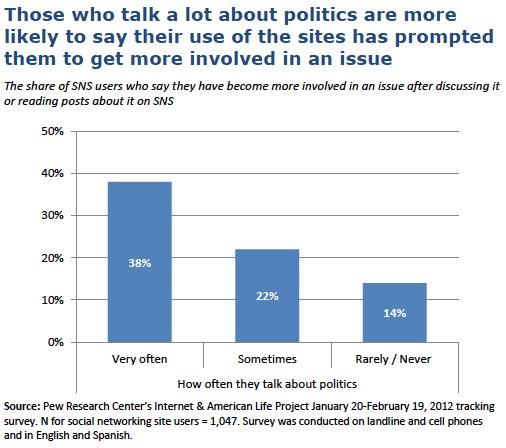Introduction
There is considerable interest in the role that social networking sites (SNS) are playing in politics and campaigns. Both Barack Obama and Mitt Romney and scores of state and local candidates and countless advocacy groups are using Facebook pages and other social media tools to try to engage voters this year. At the same time, some analysts have expressed concerns about the impact of social networking sites on the broad political culture. It is widely believed that SNS users might be living in echo chambers where they only encounter and chat with people who share and reinforce their political views.
A survey earlier this year by the Pew Research Center’s Internet & American Life Project looked at people’s general use of SNS for politics and about the ways in which they interact with friends on the sites over political material.
The findings from this survey about social networking sites and politics are being covered in two reports: The first was issued in the spring and focused on citizens’ answers to some of the questions in the survey that dealt with how SNS users deal with friends and political issues on the sites, especially when they agree and disagree with their friends’ political postings.1
Overall, the survey found that 80% of American adults use the internet and 66% of those online adults participate in social networking sites (SNS) such as Facebook, LinkedIn, or Google+. That amounts to more than half of the entire U.S. population who are SNS users.
Those who describe their political beliefs as moderate or liberal are more likely than conservatives to use social networking sites: 74% of internet users who describe themselves as liberal use SNS and 70% of internet users who are moderate are SNS users —that compares with 60% of conservative internet users who are SNS users. The chart below shows what proportion of the entire population — not just internet users — falls into these categories.
There were no statistically significant differences among Democrats, Republicans, and independents in their overall use of SNS. All were equally likely at least to be social networking site users.
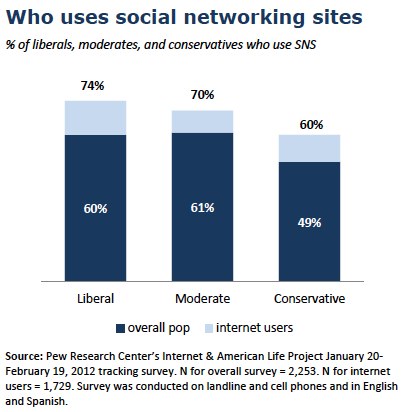
In addition, some key findings in the first report:
- There is notable disagreement among friends on social networking sites when it comes to politics.
- 38% of SNS users have discovered through their friends’ postings that their political beliefs were different than they thought they were.
- 18% of SNS users have blocked, unfriended, or hidden someone on the site because the person either posted too much about politics, disagreed with political posts, or bothered friends with political posts. And 16% of SNS users have friended someone whose political posts have appealed to them.
- 38% of SNS users have posted positive comments in response to a political post or status update from someone else.
These figures suggest that the majority of SNS users are not actively seeking out friends based on political affiliation or views, nor are most culling their networks to rid them of those with opposing political points of view.
This second report adds to that picture by exploring some questions in the survey dealing with the impact of political material on social networking site users.
The importance of social networking sites for political activities
Users of social networking sites were asked for their overall view of how important the sites are for them personally when it comes to several aspects of political activity:
- 36% of SNS users say the sites are “very important” or “somewhat important” to them in keeping up with political news.
- 26% of SNS users say the sites are “very important” or “somewhat important” to them in recruiting people to get involved in political issues that matter to them.
- 25% of SNS users say the sites are “very important” or “somewhat important” to them for debating or discussing political issues with others.
- 25% of SNS users say the sites are “very important” or “somewhat important” to them in finding other people who share their views about important political issues.
Of course, this means that sizeable majorities of social networking site users do say the sites are not too important or not important at all for those political activities. The chart below shows that breakdown by each political activity.
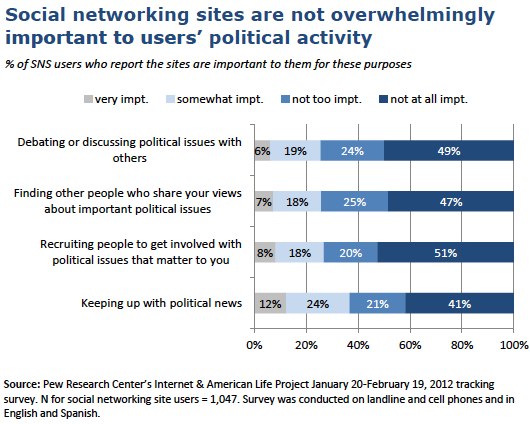
In each activity, Democrats who use social networking sites are more likely than others to say that the sites are important. In addition, compared with moderates, SNS-using liberals are also more likely to say that the sites are important for these activities.
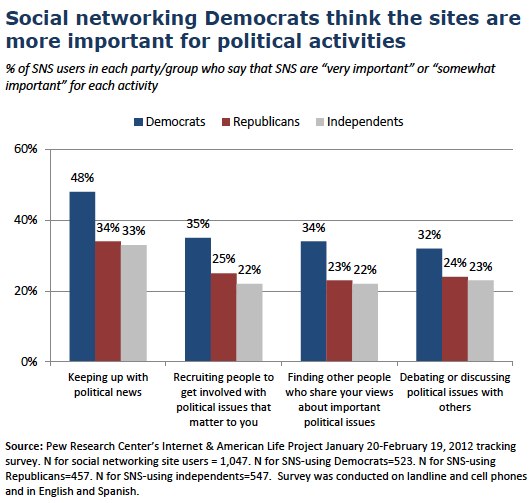
At the same time, the SNS users who describe themselves as very conservative are often among the most enthusiastic about importance of the site for various purposes. There were not enough cases in this sample to do a thorough statistical analysis, but the SNS users who self-describe as very conservative were among the most likely to say that these sites are important for keeping up with political news, recruiting others to their causes, finding like-minded friends, and debating issues.
Two other notable demographic trends show up in the survey. First, SNS-using blacks are significantly more likely than SNS-using whites to feel that the sites are important for these political activities. Second, younger SNS users (those ages 18-29) are more likely than older site users to think the sites are important in this way.
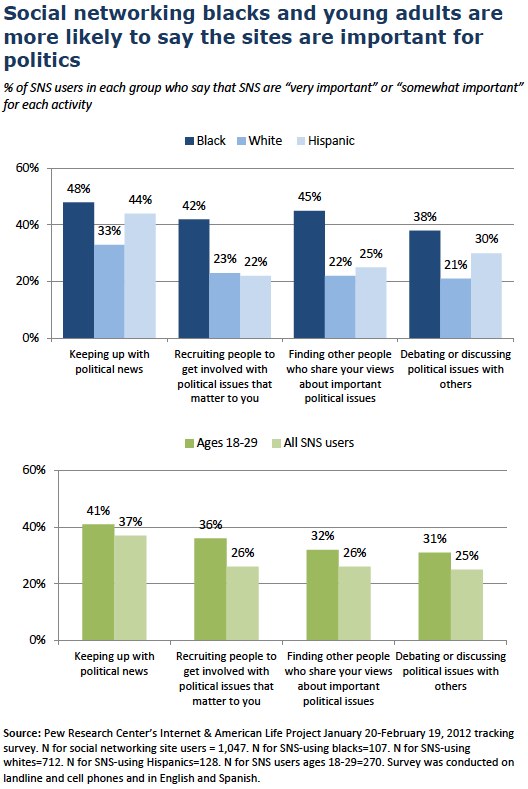
The overall impact of social networking sites on users’ political views
In keeping with their reports that social networking sites play modestly important roles for key political activities, site users also have mostly reserved views about the impact on their political views:
- 25% of SNS users say they have become more active in a political issue after discussing it or reading posts about it on the sites.
- 16% of SNS users say they have changed their views about a political issue after discussing it or reading posts about it on the sites.
- 9% of SNS users say they have become less involved in a political issue after discussing it or reading posts about it on the sites.
Put another way, the clear majority of SNS users do not report that their use of the sites has changed their political views or activity.
There are some noteworthy differences among partisans on several of these answers: Democrats and liberals who use social networking sites are more likely than others to say their activities on the sites have led them to become more active on a political issue.
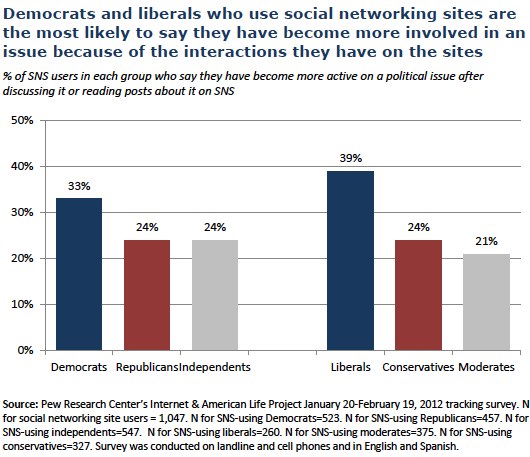
SNS users who are liberals and moderates are more likely than conservatives to say their use of the sites has prompted them to change their views on a political issue: 24% of liberal SNS users say that; 18% of moderates say that; and 11% of conservatives say that.
How much political posting social networkers do
The vast majority of SNS users (84%) say they have posted little or nothing related to politics in their recent status updates, comments, and links. Some 63% of SNS users say they posted nothing at all and another 21% say they posted “just a little.” Only 6% of these users say that most or all of what they posted recently on social networking sites is related to politics, issues, or the 2012 campaign. Another 10% say some of what they have recently posted has been about politics.
These SNS users report that their friends are somewhat more likely than they are to post political material. Yet it is still the case that a majority of SNS users (59%) say their friends on the sites have posted little or nothing about politics. Only 9% of what their SNS friends share and post is mostly or all about politics. In the case of friends’ posts, though, 30% of SNS users say some of the material from their friends is about politics.
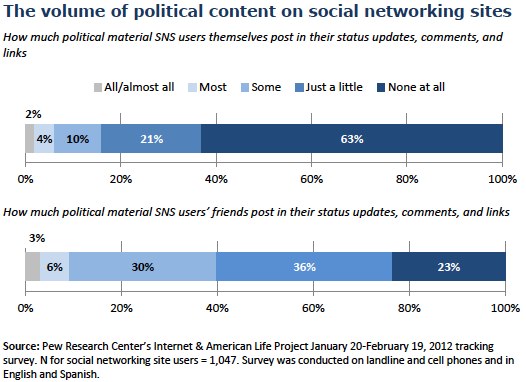
The SNS users who identify themselves as very conservative are the most likely to say all or almost all of what they post is about politics. There are not enough cases for further analysis, but it appears that the very conservative have a greater share of their postings relate to politics than other ideological groups. Similarly, the social networkers who are very conservative are somewhat more likely to have friends who post a lot about politics on the sites.
Overall, there are only modest differences along partisan lines in the volume of political posting and reading political posts. Democrats who use SNS are more likely than either Republicans or independents to say that most or all of the material their friends post is about politics, although political posts from friends are generally a minor factor for each of these groups (13% of SNS-using Democrats say all of most of the posts their friends make are about politics, compared with 7% of Republicans and 6% of independents). Democrats and Republicans who use SNS are equally likely to say most or all of the material they themselves post is about politics.
And, again, it is important to note that the biggest reality is that SNS users in all parties—84% of SNS-using Republicans; 79% of SNS-using Democrats, and 86% of SNS-using independents—say little or nothing of their recent postings on the sites has related to politics. And notable majorities in each partisan group say little or nothing of what their friends post involves political content.
Those who are quite politically attuned use social networking sites differently and get more out of them
To see how politically interested and engaged respondents to this survey are, we asked how often they talk about politics with family and friends. Some 33% say they have such conversations very often, 34% say they sometimes have such conversations, 20% say they rarely talk about politics, and 12% say they never talk about politics. It turns out that the social networking site users who say they very often talk about politics are different in their use of the sites and in assessing the impact of the sites on them.
For starters, those who generally like to talk about politics are much more likely to post material about politics on social networking sites. Some 14% of social networking site users who say they talk “very often” to family and friends about politics also say all or most of the material they post on SNS is about politics. This compares with a tiny fraction of other SNS users who say most of their posts are about politics.
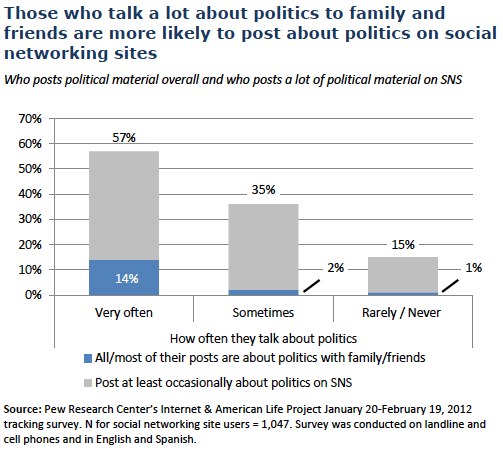
In addition, those who talk to family and friends about politics a lot are more likely to have SNS friends who post a lot about politics. Some 12% of the politically engaged say all or most of their friends’ posts are about politics, compared with a tiny fraction of others who say their friends post that often about politics.
Those who are politically engaged are also more likely than less-engaged SNS users to see material posted by their friends that mostly reflects their own political views. Some 34% of those who talk very often about politics say the material they see on SNS mostly agrees with their beliefs. Still, it is also the case that the most engaged are just as likely as others to see political material on the sites from their friends with which they disagree.
When they do see political postings with which they disagree, the most engaged SNS users are more likely than others to follow up with a reply. Some 35% of those who talk about politics “very often” say they usually respond to material that challenges their views by posting a comment in reply, while 55% say they ignore such posts. The SNS users who don’t talk very often about politics are much more inclined simply to ignore a friend’s post that challenges their point of view. About three-quarters of the less politically engaged SNS users tend to ignore material with which they disagree.
Those who talk the most and post the most about politics are also more likely than others to have drawn a strong negative reaction to the political material they contribute to SNS. Some 42% of SNS users who talk a lot about politics say they have received some blowback about their posts.
In their overall judgment, the SNS users who are politically engaged are the most enthusiastic about the role of those sites in key political activities. They are more likely than those who are less engaged with politics to say the sites are useful for keeping up with political news, for debating issues, for recruiting people to their cause, and finding others who share similar beliefs.
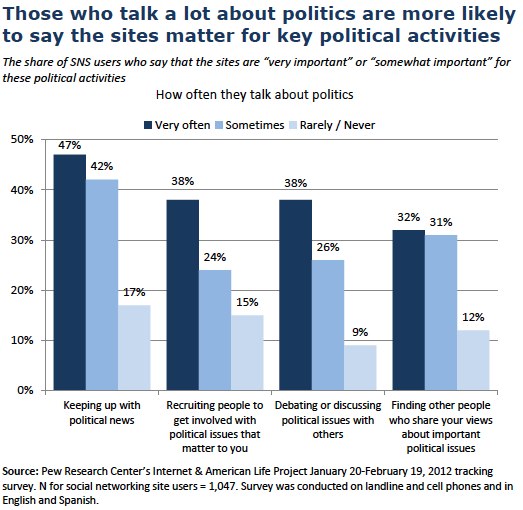
The SNS users who are the most politically engaged are also more likely than others to say their use of social networking sites has prompted them to become more active in an issue that mattered to them.
